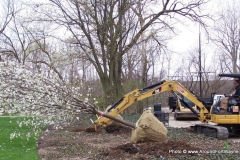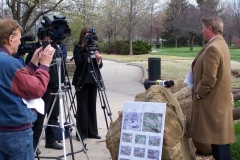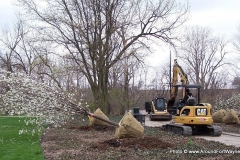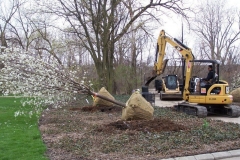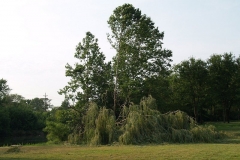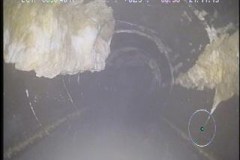
News release from Fort Wayne City Utilities:
Cold Weather Tips from Fort Wayne City Utilities
(January 3, 2014) – Here are some suggestions from Fort Wayne City Utilities for protecting your home and water supply during extremely cold temperatures:
Before freezing temperatures arrive
Insulate pipes or faucets in unheated areas
Wrapping pipes that run through unheated garages or crawl spaces can help prevent freezing. Use insulating tape and wrap it over the entire length of exposed pipe. You can also use molded flexible pipe sleeves. Cover all valves, joints, etc. with insulating tape of fiberglass insulation. You can find the supplies you need at a hardware or discount store.Protect your water meter
If you have an outdoor meter located in a pit, be sure the lid is not broken or missing. Indoor meters located in an unheated area should be protected with an insulated box that is clearly marked. If the meter is in an unheated garage, keep the garage door closed to hold in as much warmth as possible. The meter is your responsibility and replacements start at $130 if the meter is damaged.Eliminate drafts
Close off crawl space vents and openings. Repair broken or cracked windows. Make sure basement doors and windows close tightly. Many of the green techniques that help to reduce your heating bill will also help to reduce the possibility that your pipes will freeze in cold weather. For example, caulk around door frames, windows and around pipes where they enter the house to reduce incoming cold.Locate the main water shut-off valve
Most homes have a master valve or a main water shut-off that will allow you to turn off all the water coming into the house. The valve is usually located in a spot near where the main water line enters the house. If a pipe breaks somewhere in the house, you can turn off the water at this main valve. In preparing for cold weather, you may want to paint the shut off a bright color or tag it so that it’s easy to locate in an emergency. Show other family members where the main water shut-off is located.Disconnect and drain outdoor hoses
This will allow the pipe that feeds the outdoor spigot to drain and can help to prevent a hard freeze from bursting the outdoor faucet or the pipe leading to it. Some homes have a shut-off valve for the outside faucet in addition to the main shut-off valve for the whole house. If there is a separate valve, shut off the water supply to the outside faucet. Drain and coil the hose, then store it in the garage or basement to prevent damage to it.Drain in-ground sprinkling systems
Check the manufacturer’s instructions or call your installer for information on the best way to do this.
When cold weather arrives
Open doors below sinks
Especially if the sink is located against an exterior wall, opening the cabinet doors will allow warm air to reach the pipes.Let the water run
Especially if you have pipes located in an exterior wall or under a slab, let a small stream of lukewarm water run from each faucet – don’t forget the bathtub and shower. This will keep water moving through the pipes and will keep the pipes from freezing. A stream of water about the size of a pencil lead is sufficient. While this may increase your water bill slightly, it can help you avoid costly repairs if a pipe freezes and bursts.Keep the garage door closed
If your water meter is located in the garage or if you have exposed pipes in the garage, keeping the garage door closed will hold in some warmth and may help keep the pipes form freezing.
If a pipe freezes despite your precautions
Thaw the pipe
If you know where the freeze-up is located and the pipe is exposed, you may be able to thaw the pipe with a hair dryer set on a low setting. Wave the stream of warm air back and forth along the pipe until water will flow through the pipe. Never use a torch or open flame to thaw a pipe.If the frozen pipe is not exposed, shut off the main water valve and set up a portable heater where the pipes enter the house. It may take some time, but eventually all the pipes in the house will warm up. If you are using this method, do not leave the space heater unattended. You’ll know it’s OK when you switch on the main valve, turn on the faucet and water runs out.
Always use caution when using electricity near a thawing pipe.
If a pipe leaks or breaks
Once a pipe has frozen, there is a very good chance that it will break or leak. If this happens, the first thing to do is shut off the water at the master shut-off valve as quickly as possible to prevent flooding and water damage. Unless you are an experienced do-it-yourselfer, you may need to call a plumber to repair the break or leak.



